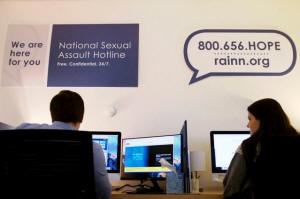|
#MeToo effect: Calls flood U.S. sexual
assault hotlines
 Send a link to a friend
Send a link to a friend
 [January 17, 2018]
By Lisa Lambert [January 17, 2018]
By Lisa Lambert
WASHINGTON (Reuters) - The phones at U.S.
sexual assault hotlines have been ringing in record numbers as the
#MeToo social movement spurs victims to reach out for help, sending
organizations scrambling to keep up.
Calls spiked when the movement began in October, with people waiting up
to three hours to talk to someone at the country's largest one, the
National Sexual Assault Hotline.
The number of calls to the hotline operated by the Rape, Abuse & Incest
National Network (RAINN) surged 25 percent in November from a year
earlier, and another 30 percent in December, according to RAINN. Its
209,480 total calls in 2017 were the most for any year since its
founding in 1993.
Last fall, actress Alyssa Milano of the television show "Charmed" asked
women who had been sexually assaulted or harassed to post "Me Too" in
response to allegations made against movie mogul Harvey Weinstein.

Weinstein, accused of sexual abuse by dozens of women, has denied having
nonconsensual sexual contact with anyone. Reuters has not been able to
independently confirm the accusations.
At the national hotline's call center, the lights that workers flip on
to indicate they are on the phone never seemed to turn off, said Celia
Gamboa, a manager at the national hotline. The chat app most callers
prefer was flooded with messages, she said. The #MeToo movement almost
always came up.
"It wasn't just a one-time thing," Gamboa said. "We're just going to
continue to see that type of flow into the future."
[to top of second column]
|

Volunteers on the National Sexual Assault Hotline work both over the
phone and via web chat at the offices of the U.S.'s largest
anti-sexual violence organization, the Rape Abuse Incest National
Network, in Washington, U.S., January 12, 2018. REUTERS/James Lawler
Duggan

RAINN added 40 employees to its staff of 200 and stepped up volunteer
recruiting, said CEO Scott Berkowitz. That has helped chip away at the
wait times, he said.
Elsewhere, Network for Victim Recovery of D.C. saw a spike in calls
about sexual harassment. Executive Director Bridgette Stumpf said
that unfortunately, the center can often only recommend private
attorneys for people whose harassment did not include violence,
adding such help may be too expensive for many victims.
The DC Rape Crisis Center now sees an average of 70 people a week
seeking legal, physical or psychological help, up from 30 to 40
before #MeToo, said Executive Director Indira Henard. It also saw a
bump in donations last fall following the #MeToo postings.
"It is for the record books," Henard said. "I don't believe there
has ever been a time in our history when we talked about sexual
violence and its impact this way."
(Reporting by Lisa Lambert; Editing by Scott Malone and David
Gregorio)
[© 2018 Thomson Reuters. All rights
reserved.]
Copyright 2018 Reuters. All rights reserved. This material may not be published,
broadcast, rewritten or redistributed.

|